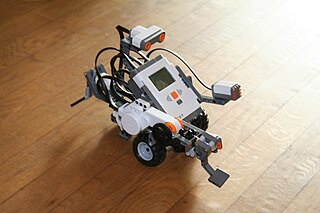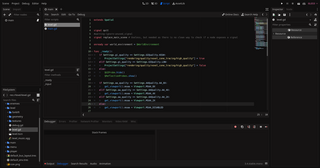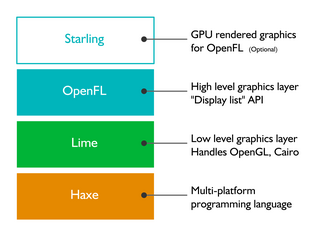
Python is a high-level, general-purpose programming language. Its design philosophy emphasizes code readability with the use of significant indentation.

Ruby is an interpreted, high-level, general-purpose programming language which supports multiple programming paradigms. It was designed with an emphasis on programming productivity and simplicity. In Ruby, everything is an object, including primitive data types. It was developed in the mid-1990s by Yukihiro "Matz" Matsumoto in Japan.

Simple DirectMedia Layer (SDL) is a cross-platform software development library designed to provide a hardware abstraction layer for computer multimedia hardware components. Software developers can use it to write high-performance computer games and other multimedia applications that can run on many operating systems such as Android, iOS, Linux, macOS, and Windows.

Allegro is a software library for video game development. The functionality of the library includes support for basic 2D graphics, image manipulation, text output, audio output, MIDI music, input and timers, as well as additional routines for fixed-point and floating-point matrix arithmetic, Unicode strings, file system access, file manipulation, data files, and 3D graphics. The library is written in the C programming language and designed to be used with C, C++, or Objective-C, with bindings available for Python, Lua, Scheme, D, Go, and other languages. Allegro comes with extensive documentation and many examples.

Lua is a lightweight, high-level, multi-paradigm programming language designed primarily for embedded use in applications. Lua is cross-platform, since the interpreter of compiled bytecode is written in ANSI C, and Lua has a relatively simple C API to embed it into applications.
Coroutines are computer program components that allow execution to be suspended and resumed, generalizing subroutines for cooperative multitasking. Coroutines are well-suited for implementing familiar program components such as cooperative tasks, exceptions, event loops, iterators, infinite lists and pipes.
Irrlicht is an open-source game engine written in C++. It is cross-platform, officially running on Windows, macOS, Linux and Windows CE and due to its open nature ports to other systems are available, including FreeBSD, Xbox, PlayStation Portable, Symbian, iPhone, AmigaOS 4, Sailfish OS via a QT/Qml wrapper, and Google Native Client.
In computer programming, glob patterns specify sets of filenames with wildcard characters. For example, the Unix Bash shell command mv *.txttextfiles/ moves all files with names ending in .txt from the current directory to the directory textfiles. Here, * is a wildcard and *.txt is a glob pattern. The wildcard * stands for "any string of any length including empty, but excluding the path separator characters ".

The GD Graphics Library is a graphics software library for dynamically manipulating images. It can create GIFs, JPEGs, PNGs, and WBMPs. The images can be composed of lines, arcs, text, other images, and multiple colors, supporting truecolor images, alpha channels, resampling, and many other features.

Fast Light Toolkit is a cross-platform widget library for graphical user interfaces (GUIs), developed by Bill Spitzak and others. Made to accommodate 3D graphics programming, it has an interface to OpenGL, but it is also suitable for general GUI programming.
In programming and software design, binding is an application programming interface (API) that provides glue code specifically made to allow a programming language to use a foreign library or operating system service.
libxml2 is a software library for parsing XML documents. It is also the basis for the libxslt library which processes XSLT-1.0 stylesheets.
A foreign function interface (FFI) is a mechanism by which a program written in one programming language can call routines or make use of services written or compiled in another one. An FFI is often used in contexts where calls are made into binary dynamic-link library.

Lego Mindstorms NXT is a programmable robotics kit released by Lego on August 2, 2006. It replaced the Robotics Invention System, the first-generation Lego Mindstorms kit. The base kit ships in two versions: the retail version and the education base set. It comes with the NXT-G programming software or the optional LabVIEW for Lego Mindstorms. A variety of unofficial languages exist, such as NXC, NBC, leJOS NXJ, and RobotC. A second-generation set, Lego Mindstorms NXT 2.0, was released on August 1, 2009, with a color sensor and other upgrades. The third-generation EV3 was released in September 2013.
Panda3D is a game engine that includes graphics, audio, I/O, collision detection, and other abilities relevant to the creation of 3D games. Panda3D is free, open-source software under the revised BSD license.

Box2D is a free open source 2-dimensional physics simulator engine written in C++ by Erin Catto and published under the MIT license. It has been used in Crayon Physics Deluxe, Limbo, Rolando, Incredibots, Angry Birds, Tiny Wings, Shovel Knight, Transformice, Happy Wheels, and many online Flash games, as well as iPhone, iPad and Android games using the Cocos2d or Moscrif game engine and Corona framework.

A scripting language or script language is a programming language that is used to manipulate, customize, and automate the facilities of an existing system. Scripting languages are usually interpreted at runtime rather than compiled.
Cocos2d is an open-source game development framework for creating 2D games and other graphical software for iOS, Android, Windows, macOS, Linux, HarmonyOS, OpenHarmony and web platforms. It is written in C++ and provides bindings for various programming languages, including C++, C#, Lua, and JavaScript. The framework offers a wide range of features, including physics, particle systems, skeletal animations, tile maps, and others.

OpenFL is a free and open-source software framework and platform for the creation of multi-platform applications and video games. OpenFL applications can be written in Haxe, JavaScript, or TypeScript, and may be published as standalone applications for several targets including iOS, Android, HTML5, Windows, macOS, Linux, WebAssembly, Flash, AIR, PlayStation 4, PlayStation 3, PlayStation Vita, Xbox One, Wii U, TiVo, Raspberry Pi, and Node.js.
FlatBuffers is a free software library implementing a serialization format similar to Protocol Buffers, Thrift, Apache Avro, SBE, and Cap'n Proto, primarily written by Wouter van Oortmerssen and open-sourced by Google. It supports “zero-copy” deserialization, so that accessing the serialized data does not require first copying it into a separate part of memory. This makes accessing data in these formats much faster than data in formats requiring more extensive processing, such as JSON, CSV, and in many cases Protocol Buffers. Compared to other serialization formats however, the handling of FlatBuffers requires usually more code, and some operations are not possible.











